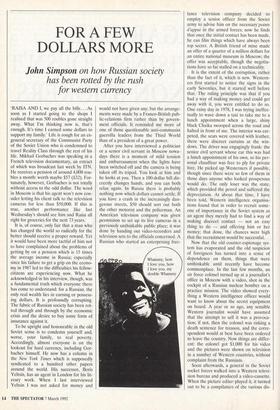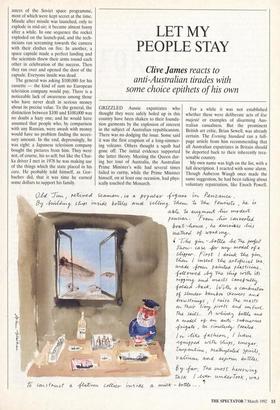FOR A FEW DOLLARS MORE
John Simpson on how Russian society has been rotted by the rush for western currency
`RAISA AND I, we pay all the bills ... As soon as I started going to the shops I realised that was 500 roubles gone straight away. What I'm thinking now is, that's enough. It's time I earned some dollars to support my family.' Life is rough for an ex- general secretary of the Communist Party of the Soviet Union who is condemned to travel Reality Class through the rest of his life. Mikhail Gorbachev was speaking in a French television documentary, an extract of which was broadcast last week by ITN. He receives a pension of around 4,000 rou- bles a month: worth maybe $57 (£32). For- tunately, however, Gorbachev is not totally without access to the odd dollar. The v.ord in Moscow is that his agent won't now con- sider letting his client talk to the television cameras for less than $50,000. If this is true, another performance like last Wednesday's should see him and Raisa all right for groceries for the next 73 years.
It is, of course, only fair that a man who has changed the world so radically for the better should receive a proper reward. Yet it would have been more tactful of him not to have complained about the problems of getting by on a pension which is 15 times the average income in Russia; especially since his failure to get a grip on the econo- my in 1987 led to the difficulties his fellow- citizens are experiencing now. What he acknowledged in his interview, though, was a fundamental truth which everyone there has come to understand: for a Russian, the only real wealth lies in earning or possess- ing dollars. It is profoundly corrupting. The fabric of Russian society has been rot- ted through and through by the economic crisis and the desire to buy some form of insurance against it.
To be upright and honourable in the old Soviet sense is to condemn yourself and, worse, your family, to real poverty. Accordingly, almost everyone is on the lookout for hard currency, including Gor- bachev himself. He now has a column in the New York Times which is supposedly syndicated to a hundred other . papers around the world. His successor, Boris Yeltsin, has an agent in London for his lit- erary work. When I last interviewed Yeltsin I was not asked for money and
would not have given any; but the arrange- ments were made by a Franco-British pub- lic-relations firm rather than by govern- ment officials. It reminded me more of one of those questionable anti-communist guerrilla leaders from the Third World than of a president of a great power.
After you have interviewed a politician or a senior civil servant in Moscow nowa- days there is a moment of mild tension and embarrassment when the lights have been switched off and the camera is being taken off its tripod. You look at him and he looks at you. Then a 100-dollar bill dis- creetly changes hands, and you can both relax again. In Russia there is probably nothing now which dollars cannot settle. If you have a crash in the increasingly dan- gerous streets, $50 should sort out both the other motorist and the policeman. An American television company was given permission to set up its live cameras in a previously unthinkable public place; it was done by handing out video-recorders and television sets to the officials concerned. A Russian who started an enterprising free-
lance television company decided to employ a senior officer from the Soviet army to advise him on the necessarypoints d'appui in the armed forces; now he finds that once the initial contact has been made, he can film things which have always been top secret. A British friend of mine made an offer of a quarter of a million dollars for an entire national museum in Moscow; the offer was acceptable, though the negotia- tions have so far stalled on a technicality.
It is the extent of the corruption, rather than the fact of it, which is new. Western- ers first started to notice the signs in the early Seventies, but it started well before that. The ruling principle was that if you had a way of making money and could get away with it, you were entitled to do so. One rainy day in 1978, I was trying ineffec- tually to wave down a taxi to take me to a lunch appointment when a large, shiny black Chaika swooped across the road and halted in front of me. The interior was car- peted, the seats were covered with leather, there were discreet curtains at the win- dows. The driver was engagingly frank: the senior civil servant whose car this was had a lunch appointment of his own, so his per- sonal chauffeur was free to ply for private hire. He picked up Westerners if possible, though since there were so few of them in those days anyone who looked prosperous would do. The only loser was the state, which provided the petrol and suffered the depreciation. At about that time, I have been told, Western intelligence organisa- tions found that in order to recruit some- one of importance in the Soviet system as an agent they merely had to find a way of making discreet contact — not an easy thing to do — and offering him or her money; that done, the chances were high that the recruitment would be successful.
Now that the old counter-espionage sys- tem has evaporated and the old suspicion of foreigners has turned into a sense of dependence on them, things that were unthinkable until recently have become commonplace. In the last few months, an air force colonel turned up at a journalist's office in Moscow with a video, shot in the cockpit of a Russian nuclear bomber on a practice mission. The video showed every- thing a Western intelligence officer would want to know about the secret equipment on board. A year or so ago, any sensible Western journalist would have assumed that the attempt to sell it was a provoca- tion; if not, then the colonel was risking a death sentence for treason, and the corre- spondent would at best have been ordered to leave the country. Now things are differ- ent: the colonel got $1,000 for his video and the pictures were shown on television in a number of Western countries, without complaint from the Russians.
Soon afterwards, a general in the Soviet rocket forces walked into a Western televi- sion bureau and produced a video-cassette. When the picture editor played it, it turned out to be a compilation of the various dis- asters of the Soviet space programme, most of which were kept secret at the time. Missile after missile was launched, only to explode in mid-air; it became almost funny after a while. In one sequence the rocket exploded on the launch-pad, and the tech- nicians ran screaming towards the camera with their clothes on fire. In another, a space capsule made a perfect landing and the scientists threw their arms round each other in celebration of the success. Then they ran over and opened the door of the capsule. Everyone inside was dead.
The general was asking $100,000 for his cassette — the kind of sum no European television company would pay. There is a noticeable lack of awareness among those who have never dealt in serious money about its precise value. To the general, the distinction between $100 and $100,000 was no doubt a hazy one; and he would have assumed that people who, by comparison with any Russian, were awash with money would have no problem finding the neces- sary amount. In the end, depressingly, he was right: a Japanese television company bought the pictures from him. They were not, of course, his to sell; but like the Chai- ka driver I met in 1978 he was making use of the things which the state placed in his care. He probably told himself, as Gor- bachev did, that it was time he earned some dollars to support his family.



















































 Previous page
Previous page